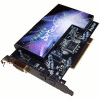- Qualcomm Launches Snapdragon 4 Gen 2 Mobile Platform
- AMD Launches Ryzen PRO 7000 Series Mobile & Desktop Platform
- Intel Launches Sleek Single-Slot Arc Pro A60 Workstation Graphics Card
- NVIDIA Announces Latest Ada Lovelace Additions: GeForce RTX 4060 Ti & RTX 4060
- Maxon Redshift With AMD Radeon GPU Rendering Support Now Available
Razer Barracuda AC-1 Sound Card

With the anticipated release of the Razer Mako loudspeakers, we have a look at Razer’s Barracuda AC-1 audio card, and compare it to two other common audio solutions. The Barracuda AC-1 boasts an impressive feature set, and its audio chipset has an excellent reputation for sound quality. Will it be a fitting partner for the new Mako speakers?
Page 6 – Performance Testing
|
|
At the start of the review, I explained how a sound card can affect your PC’s overall performance while running sound-intensive applications. Here we put the rubber to the road and actually see how the Razer Barracuda will affect your maximum machine performance. In my last test, I compared an onboard Realtek audio chipset, a Sound Blaster Audigy4 sound card, and the Barracuda AC-1. I’ll be comparing these three audio solutions based on CPU usage, to quantify how each card will affect your system’s overall performance. This test will be based on 16, 32, 64, and 128 simultaneous buffers (concurrent sounds).
- The Test System
- AMD Athlon 64 X2 5200+ CPU
- 2GB OCZ Gold DDR2 800 memory
- ABIT KN9 Ultra (nForce 570) motherboard
- HIS Radeon X1650XT 256MB video card
- Seagate Barracuda 7200.10 320GB hard drive
- Microprocessor-controlled silent cooling system
To make these measurements, RightMark 3DSound 2.3 was used to generate random noise and load each audio card with a number of concurrent buffers, which was varied to show a trend in the increase of CPU usage based on different cards. The program’s algorithm monitored CPU usage over a period of 1 minute for each test, and then averaged the values over time. All other programs running on the computer were closed to minimize variance based on other programs vying for the CPU.



So, what does this all mean? The Audigy4 stayed below 2% CPU utilization through all tests, making it the best performer of the bunch – it will make the least impact on your CPU usage. Because the C-Media CMI8788 audio chipset performs most of its signal processing in software, there’s very little hardware acceleration available, which means that your CPU will take more of a performance hit with the Barracuda (or any OxygenHD-based sound card) than it would with one of Creative Labs’ Sound Blaster solutions, like the Audigy4 or X-Fi. However, in the grand scheme of things, either sound card is a significant improvement over using a Realtek HD Audio onboard chipset, which was shown to be by far the worst offender in CPU loading.
|
|
Support our efforts! With ad revenue at an all-time low for written websites, we're relying more than ever on reader support to help us continue putting so much effort into this type of content. You can support us by becoming a Patron, or by using our Amazon shopping affiliate links listed through our articles. Thanks for your support!




